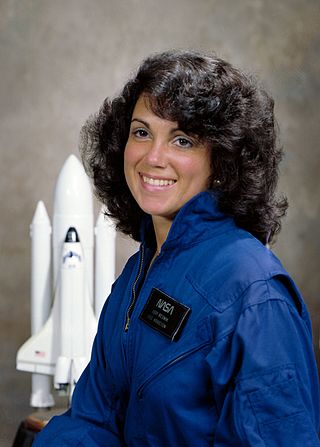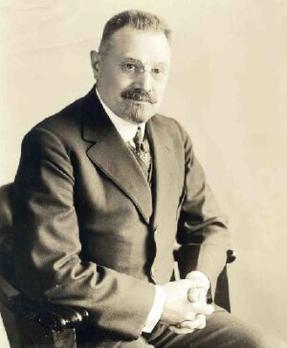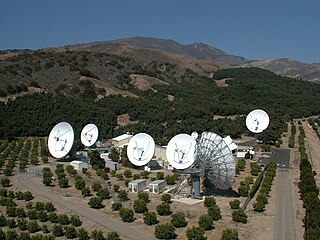Related Research Articles

Judith Arlene Resnik was an American electrical engineer, software engineer, biomedical engineer, pilot and NASA astronaut who died in the Space Shuttle Challenger disaster. She was the fourth woman, the second American woman and the first Jewish woman of any nationality to fly in space, logging 145 hours in orbit.

Anthony Wayne "Tony" England is an American former NASA astronaut. Selected in 1967, England was among a group of astronauts who served as backups during the Apollo and Skylab programs. Like most others in his class, he flew during the Space Shuttle program, serving as a mission specialist on STS-51-F in 1985. He has logged more than 4,000 hours of flying time and 188 hours in space.

Eta Kappa Nu (ΗΚΝ) or IEEE-HKN is the international honor society of the Institute of Electrical and Electronics Engineers (IEEE). Joining HKN is by invitation only. Membership is a lifelong designation for individuals who have distinguished themselves as students or as professionals in electrical engineering, computer engineering, computer science, and other fields of IEEE interest.

John William Lieb was an American electrical engineer for the Edison Electric Light Company. Lieb was president of the American Institute of Electrical Engineers from 1904 to 1905. He received the IEEE Edison Medal for "the development and operation of electric central stations for illumination and power."

Robert D. Briskman is Technical Executive of Sirius XM Radio.
The IEEE Jack S. Kilby Signal Processing Medal is presented "for outstanding achievements in signal processing" theory, technology or commerce. The recipients of this award will receive a gold medal, together with a replica in bronze, a certificate and an honorarium.
The IEEE Dennis J. Picard Medal for Radar Technologies and Applications is an award presented for outstanding accomplishments in advancing the fields of radar technologies and their applications. This award can be presented to an individual or group of up to three people.
The IEEE Reynold B. Johnson Data Storage Device Technology Award was a Technical Field Award of the IEEE that was established by the IEEE Board of Directors in 2004 and was discontinued in 2011. The award was presented annually from 2006–2010 for outstanding contributions to the advancement of information storage, with an emphasis on technical contributions in computer data storage device technology. The award was named to honor Reynold B. Johnson.
The IEEE Richard M. Emberson Award was established by the IEEE Board of Directors in 1986. It is presented to an IEEE member for distinguished service to the development, viability, advancement, and pursuit of the technical objectives of the IEEE.
The IEEE Donald G. Fink Prize Paper Award was established in 1979 by the board of directors of the Institute of Electrical and Electronics Engineers (IEEE) in honor of Donald G. Fink. He was a past president of the Institute of Radio Engineers (IRE), and the first general manager and executive director of the IEEE. Recipients of this award received a certificate and an honorarium. The award was presented annually since 1981 and discontinued in 2016.
In 2002, the Institute of Electrical and Electronics Engineers (IEEE) added a new award to its already existing program of awards. Each year, one or more nominees are honored with a medal in the name of Jun-ichi Nishizawa, considered to be the father of Japanese microelectronics. Nishizawa was professor, director of two research institutes and the 17th president at Tohoku University, Sendai, Japan, and contributed important innovations in the fields of optical communications and semiconductor devices, such as laser and PIN diodes and static induction thyristors for electric power applications.
IEEE Transactions on Aerospace and Electronic Systems is a bimonthly peer-reviewed scientific journal published by the IEEE Aerospace and Electronic Systems Society. It covers the organization, design, development, integration, and operation of complex systems for space, air, ocean, or ground environment. The editor-in-chief is Gokhan Inalhan. According to the Journal Citation Reports, the journal has a 2020 impact factor of 4.102.
AlfonsoFarinaFREng is an Italian electronic engineer and former industry manager. He is most noted for the development of the track while scan techniques for radars and generally for the development of a wide range of signal processing techniques used for sensors where tracking plays an essential role. He is author of about 1000 publications. His work was aimed to a synergistic cooperation between industry and academy.

Kamal Sarabandi is an Iranian-American scientist and the Fawwaz T. Ulaby Distinguished University Professor of EECS and the Rufus S. Teesdale endowed Professor of Engineering at the University of Michigan, where he teaches and conducts research on the science and technology of microwave and millimeter wave radar remote sensing, wireless technology, electromagnetic wave propagation and scattering, metamaterials, antenna miniaturization, and nano antennas.
Surendra Prasad is an Indian communications engineer, a former director and an Usha chair professor of the Indian Institute of Technology, Delhi. He is also an emeritus professor of Bharti School of Telecommunication Technology And Management, a joint venture of IIT Delhi and is known for developing new techniques, algorithms and hardware in signal processing. He is an elected fellow of all the three major Indian science academies viz. Indian Academy of Sciences, Indian National Science Academy and the National Academy of Sciences, India. as well as the Indian National Academy of Engineering. The Council of Scientific and Industrial Research, the apex agency of the Government of India for scientific research, awarded him the Shanti Swarup Bhatnagar Prize for Science and Technology, one of the highest Indian science awards for his contributions to Engineering Sciences in 1988.

Daniele Mortari is Professor of Aerospace Engineering at Texas A&M University and Chief Scientist for Space for Texas A&M ASTRO Center. Mortari is known for inventing the Flower Constellations and the k-vector range searching technique and the Theory of Functional Connections.
Maruthi Ram Akella is an Indian-American aerospace engineer. Akella specializes in the control of complex dynamical systems that are subject to large scale nonlinearities and uncertainties.
Roberto Sabatini is an Italian-Australian research engineer and academic specializing in aerospace and defense systems. Currently, he is a full professor at Khalifa University of Science and Technology (UAE) and honorary professor at RMIT University (Australia). Sabatini holds or has held visiting and consulting appointments at a number of institutions, including: Polytechnic University of Turin (Italy); Chosun University ; Durban University of Technology/Space Science Center ; the UAE Space Agency; and the Korea Aerospace Research Institute. Additionally, Sabatini is a member of the Board of Governors of the IEEE Aerospace and Electronic Systems Society (AESS), Chair of the IEEE AESS Avionics Systems Panel, and Distinguished Lecturer of the IEEE AESS
Pramod Kumar Varshney is a computer scientist and an electrical engineer at Syracuse University's College of Engineering and Computer Science. He is known for research on distributed detection theory.
References
- 1 2 "IEEE Judith A. Resnik Award". IEEE . Retrieved April 2, 2011.
- 1 2 "IEEE Judith A. Resnik Award Recipients" (PDF). IEEE . Retrieved December 30, 2022.
- 1 2 "IEEE AESS Judith A. Resnik Space Award". IEEE Aerospace and Electronic Systems Society. Retrieved December 31, 2022.
- ↑ "Faculty Profile: Azad M Madni". University of Southern California. Retrieved December 31, 2022.
- ↑ "Robert D. Briskman Receives 2017 IEEE/AESS Judith A. Resnik Space Award". University of Maryland. September 26, 2017. Retrieved December 31, 2022.
- ↑ "Maruthi Akella Wins IEEE Judith A. Resnik Award". August 14, 2015. Retrieved December 30, 2022.
- ↑ Rodoski, Kelly Homan (May 1, 2012). "Varshney to receive IEEE Judith A. Resnik Award for pioneering work in wireless technology". Syracuse University. Retrieved December 30, 2022.
- ↑ "Kamal Sarabandi honored with 2011 IEEE Judith A. Resnik Award". University of Michigan. July 1, 2010. Retrieved December 30, 2022.
- ↑ "Surendra Pal - Engineering and Technology History Wiki". Ieeeghn.org. Retrieved 29 October 2017.
- ↑ "Sudhakar K. Rao - Engineering and Technology History Wiki". Ieeeghn.org. Retrieved 29 October 2017.
- ↑ "Daniele Mortari awards". Texas A&M University. Retrieved December 31, 2022.
- ↑ "Marcos Bergamo - Engineering and Technology History Wiki". Ieeeghn.org. Retrieved 29 October 2017.
- ↑ "Collins earns the Resnik Award". Notre Dame University. November 13, 1997. Retrieved December 30, 2022.
- ↑ "PORTRAIT: Prof. Léandre Pourcelot". Universite de Tours. September 1, 2020. Retrieved December 31, 2022.